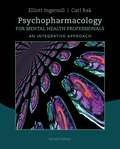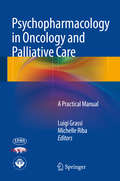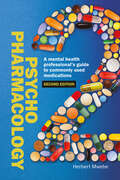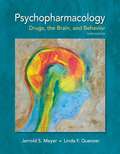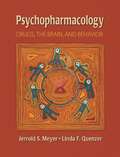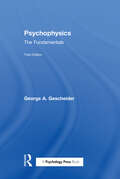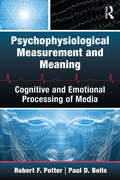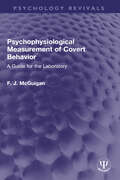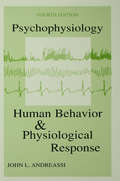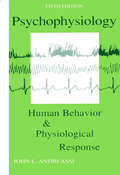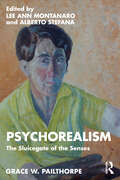- Table View
- List View
Psychopharmacology Reconsidered: A Concise Guide Exploring the Limits of Diagnosis and Treatment
by Robert Haim Belmaker Pesach LichtenbergThis thought-provoking book covers the full range of psychopharmacologic practice in textbook fashion, offering a fresh and comprehensive self-examination. Unlike conventional texts of psychopharmacology, this text speaks directly to clinicians who have started to question the limitations of psychopharmacologic claims and the rigid confines of DSM-5 diagnoses. Drawing from their clinical and research experience as well as new literature, the well-published authors provide a new perspective that encourages readers to reevaluate established practices and embrace that medication is just one component of treatment and has limits. The book could be used by psychiatric residents in their course of study, by clinical psychology students taking a psychopharmacology course, or by psychiatrists curious to get a readable but comprehensive look at new critical viewpoints in psychopharmacology that have changed since they were taught. Many neuroscience students who are looking for a review of clinical effects to guide their basic research may also find the proposed text more useful than those texts that collate clinical trials.Current texts are for specialized scientists or are part of multi-authored texts which list drugs alphabetically with no conceptual framework, or books that pretend that each biochemical drug property has a clear and known clinical result presented in cartoon style. Some lesser known texts for psychology or nursing students are not authoritative. Others aimed at patients or families are too simplistic for clinicians. The authors’ goal was to create a unified text expressing their view of psychopharmacology, its evidence base, the unity of its essential principles, and its independence of DSM or ICD diagnosis.Several new history books describe the "rise and fall" of psychopharmacology, the corruption of big pharma and the failure of large controlled clinical trials. Psychopharmacology Reconsidered: A Concise Guide Exploring the Limits of Diagnosis and Treatment ensures that young clinicians are aware of and understand this critical zeitgeist but aware also of the essential core of psychopharmacology and the evidence upon which it rests.
Psychopharmacology and Pregnancy
by Megan Galbally Martien Snellen Andrew LewisThis book examines the role of psychopharmacological treatment in a range of disorders that may be encountered during pregnancy, including major depressive disorders, anxiety disorders, bipolar affective disorder, schizophrenia, eating disorders and substance abuse. The natural history of each condition pre and post-partum is analyzed and the evidence for the efficacy of drug treatments, evaluated. Special attention is paid to the potential dangers of different treatment options for both mother and fetus, covering risks of malformation, pregnancy and obstetric risks, neonatal risks and possible long-term consequences. The risks of not treating a particular condition are also analyzed. On the basis of the available evidence, management guidelines are provided that additionally take into account non-pharmacological options. Closing chapters consider the value of complementary and alternative medicine and ECT and explore future research directions.
Psychopharmacology for Mental Health Professionals: An Integrative Approach (2nd Edition)
by R. Elliott Ingersoll Carl F. RakThis book is an introductory level text on psycho-pharmacology for students preparing for careers in psychology, counselling, and social work.
Psychopharmacology for Nonpsychiatrists: A Primer
by Daniel P. GreenfieldThis unique, easy-to-read title offers a concise, practical guide to psychopharmacology and psychopharmacotherapy. Designed for a wide range of practitioners and trainees in general and mental healthcare, this invaluable primer provides foundational information for those who wish to cultivate a deeper understanding of the often-mysterious psychopharmacology medication family. Unlike other books on this topic, the primer positions psychopharmacology within the larger context of psychiatric and psychological treatment and also discusses the variety of therapeutic and somatic techniques available to providers and their patients. Further, since many patients with psychiatric conditions unfortunately find themselves interacting with the justice system, the author offers useful considerations related to the intersection of mental health and the law.The primer consists of 13 chapters and is organized in four parts: Part 1 covers essentials of pharmacology and psychopharmacology, outlining the basic principles of pharmacology, psychopharmacology, and psychopharmacotherapy. Part 2 addresses therapies that may involve psychopharmacology/ psychopharmacotherapy, providing a succinct overview of selected and representative types of psychotherapy and counseling in contemporary psychiatry and psychology. Part 3 discusses forensic and legal applications of psychopharmacology/ psychopharmacotherapy, drawing on the author’s long experience in various aspects of forensic psychiatry. Part 4 consists of one final chapter, titled “Synthesis and Conclusions.” This chapter pulls together the most salient points of the book to assist the reader in the practical psychopharmacotherapeutic treatment of patients/clients.A timely and invaluable contribution to the literature, Psychopharmacology for Non-Psychiatrists: A Primer will be of great benefit as a user-friendly resource for professionals or as an exam-preparation book for medical students and trainees in a wide range of mental health fields. Specifically, the primer will be of great interest to primary care physicians, nurse practitioners, physician assistants, counselors, therapists, non-psychiatric physicians and dentists whose practices involve psychopharmacotherapy, naturopaths, homeopaths, physical therapists, occupational therapists, and speech/language therapists. Legal professionals and others who are not themselves healthcare professionals, but who interact with healthcare professionals, also will find the primer a handy resource.
Psychopharmacology in Oncology and Palliative Care
by Luigi Grassi Michelle RibaThis practical manual presents the main drugs and protocols currently used in the psychopharmacological treatment of psychiatric disorders in cancer and palliative care settings and explores the principal issues involved in such treatment. Significant clinical challenges encountered in the psychopharmacological management of various psychiatric conditions are discussed, covering aspects such as side-effects and drug-drug interactions. Attention is also paid to the emerging theme of adjuvant use of psychotropic drugs for the treatment of symptoms or syndromes not primarily related to psychiatric disorders. In addition, practical suggestions are provided for dealing with special populations, including children and the elderly. The book is designed to be easy to read and to reference, with helpful concise tables and boxes. The authors include some of the most renowned clinicians working in the field of psycho-oncology.
Psychopharmacology: A mental health professional’s guide to commonly used medications (Nursing)
by Herbert MwebeUnlocking the enigma of effective medication management in mental health.This comprehensive guide offers mental health professionals a practical roadmap to the use of psychotropic drugs in clinical settings. It's a resource born out of Herbert Mwebe's extensive experience in mental health care and academia, and it delves deep into the intricacies of treating mental illnesses such as psychoses, depression, dementia, and bipolar disorder.The book covers four key areas: the history and effects of psychotropic drugs, the importance of individualised care, the critical role of combining medication with alternative interventions, and the necessity of monitoring and managing adverse effects. The book provides a detailed overview of the recommended medications for adults with mental health disorders. It stresses the importance of a personalised, multidisciplinary approach to patient care. It emphasises the critical role of combining medication with psychosocial interventions for treating mental illnesses. Lastly, it underscores the necessity of monitoring and managing the adverse effects associated with these medications.This book empowers mental health professionals to make informed decisions about prescribing psychotropic drugs, leading to improved patient outcomes. They will be better equipped to manage the adverse effects of medications, integrate pharmacological and psychosocial treatment strategies, and provide personalised care, irrespective of their level of proficiency. The book also serves as a valuable tool in meeting Nursing and Midwifery Council (NMC) competencies in medication management.
Psychopharmacology: Drugs, The Brain, And Behavior
by Jerrold Meyer Linda QuenzerUnique in its breadth of coverage ranging from historical accounts of drug use to clinical and preclinical behavioral studies, Psychopharmacology is appropriate for undergraduates studying the relationships between the behavioral effects of psychoactive drugs and their mechanisms of action.
Psychopharmacology: Drugs, the Brain, and Behavior
by Jerrold S. Meyer Linda F. QuenzerRecent advances in molecular pharmacology and brain imaging have revolutionized our understanding of how psychoactive drugs work. Now, from the authors of Principles of Neuropsychopharmacology, comes a new undergraduate textbook integrating these developments. The first section of the book provides extensive foundation materials, including the basic principles of pharmacology, neurophysiology and neuroanatomy, synaptic transmission, and methods in psychopharmacology. The second section describes key features of major neurotransmitter systems, including the catecholamines, serotonin, acetylcholine, glutamate and GABA. The third and fourth sections discuss theories and mechanisms of drug addiction and psychopathology. All major substances of abuse as well as drugs used to treat mental illness are covered.
Psychopharmacology: Straight Talk on Mental Health Medications
by Joseph Wegmann<p>Congratulations to Joe Wegmann, and his book, Psychopharmacology, 3rd Edition, for winning a silver medal at the 2016 IBPA Benjamin Franklin Awards for editorial and design excellence in the Professional & Technical category. <p>This is the definitive guide and desk reference for healthcare professionals and patients to expand their knowledge in the pharmacological and behavioral treatment of psychosis, anxiety, depression, bipolar, insomnia and ADHD.</p>
Psychopharmacology: Straight Talk on Mental Health Medications
by Joseph WegmannA comprehensive professional resource for mental health treatment – now in it’s fourth edition! Since 2009, Psychopharmacology: Straight Talk on Mental Health Medications has been the go-to desk reference for professionals who want to expand their knowledge of pharmacological treatment on mental health issues. Author Joe Wegmann draws on over three decades of clinical experience in psychopharmacology and psychotherapy, to provide his unique perspective on psychotropic medication management. He is nationally known for the practical, relevant, and insightful psychopharmacology information he presents in his books, columns, articles, blogs, and workshops – and this edition is no exception. Packed with detailed discussions of clinical diagnoses, as well as the effectiveness of current treatments, including complementary and alternative medicine, this fourth edition provides the reader a useable blend of the science and art associated with contemporary best practices.
Psychopharmaka
by Otto Dietmaier Gerd LauxIn diesem Ratgeber erfahren Patienten und Angehörige, was sie über Psychopharmaka und ihren Nutzen wissen müssen: Wie wirken die Substanzen? Welche Nebenwirkungen haben Psychopharmaka? Wo liegen die Grenzen dessen, was Psychopharmaka leisten können? Verständlich präsentieren die Autoren Fakten, sie räumen mit Mythen auf und treten damit Vorbehalten und Vorurteilen entgegen, die häufig über Psychopharmaka geäußert werden.
Psychopharmaka als Mittel zur Freiheitsbeschränkung: Ethische Bewertung für Medizin, Pflege und Pharmazie (essentials)
by Rainer HeidePsychopharmaka werden in jüngster Zeit vermehrt als Mittel einer möglichen Freiheitsbeschränkung besonders in Einrichtungen der stationären Altenpflege angesehen. Der Autor beleuchtet das Thema sowohl pharmazeutisch und medizinisch als auch rechtsphilosophisch, insbesondere aber aus dem moral-philosophischen und ethischen Blickwinkel.
Psychopharmaka: Ratgeber für Patienten und Angehörige
by Otto Dietmaier Gerd LauxIn diesem Ratgeber erfahren Patienten und Angehörige, was sie über Psychopharmaka und ihren Nutzen wissen müssen: Wie wirken die Substanzen? Welche Nebenwirkungen haben Psychopharmaka? Wo liegen die Grenzen dessen, was Psychopharmaka leisten können? Verständlich präsentieren die Autoren Fakten, sie räumen mit Mythen auf und treten damit Vorbehalten und Vorurteilen entgegen, die häufig über Psychopharmaka geäußert werden.
Psychopharmakologischer Leitfaden für Psychologen und Psychotherapeuten
by Martin Hautzinger Otto Benkert Mechthild Graf-Morgenstern Philip Heiser Christoph Hiemke Eberhard SchulzEine optimale Therapie ist heute bei den meisten psychischen Störungen ohne Psychopharmaka nicht mehr vorstellbar, genauso wenig wie eine Behandlung in der Psychiatrie ohne Psychotherapie. In dem Buch werden die Spezifika der Psychopharmakotherapie in allen ihren Facetten besprochen und der Einsatz der Medikamente in einem Gesamtbehandlungsplan bewertet. Jedes Kapitel endet mit Kontrollfragen, so dass sich psychologische Psychotherapeuten auf die Abschlussprüfung vorbereiten oder ihren Kenntnisstand überprüfen können.
Psychophysical Acting: An Intercultural Approach after Stanislavski
by Phillip B. ZarrilliPsychophysical Acting is a direct and vital address to the demands of contemporary theatre on today’s actor. Drawing on over thirty years of intercultural experience, Phillip Zarrilli aims to equip actors with practical and conceptual tools with which to approach their work. Areas of focus include:an historical overview of a psychophysical approach to acting from Stanislavski to the presentacting as an ‘energetics’ of performance, applied to a wide range of playwrights: Samuel Beckett, Martin Crimp, Sarah Kane, Kaite O’Reilly and Ota Shogoa system of training though yoga and Asian martial arts that heightens sensory awareness, dynamic energy, and in which body and mind become onepractical application of training principles to improvisation exercises.Psychophysical Acting is accompanied by Peter Hulton’s downloadable resources featuring exercises, production documentation, interviews, and reflection.
Psychophysics Beyond Sensation: Laws and Invariants of Human Cognition (Scientific Psychology Series)
by Christian Kaernbach Erich Schr Hermann MThis volume presents a series of studies that expand laws, invariants, and principles of psychophysics beyond its classical domain of sensation. This book's goal is to demonstrate the extent of the domain of psychophysics, ranging from sensory processes, through sensory memory and short-term memory issues, to the interaction between sensation and action. The dynamics and timing of human performance are a further important issue within this extended framework of psychophysics: Given the similarity of the various cortical areas in terms of their neuroanatomical structure, it is an important question whether this similarity is paralleled by a similarity of processes. These issues are addressed by the contributions in the present volume using state-of-the-art research methods in behavioral research, psychophysiology, and mathematical modeling. The book is divided into four sections. Part I presents contributions concerning the classical domain of psychophysical judgment. The next two parts are concerned with elementary and higher-order processes and the concluding section deals with psychophysical models. The sections are introduced by guest editorials contributed by independent authors. These editorials present the authors' personals view on the respective section, providing an integrated account of the various contributions or highlighting their focus of interest among them. While also voicing their own and sometimes different point of view, they contribute to the process of discussion that makes science so exciting. This volume should be of great interest to advanced students in neuroscience, cognitive science, psychology, neuropsychology, and related areas who seek to evaluate the range and power of psychological work today. Established scientists in those fields will also appreciate the variety of issues addressed within the same methodological framework and their multiple interconnections and stimulating "cross-talk."
Psychophysics: Introduction to Its Perceptual, Neural and Social Prospects
by S.S. StevensPsychophysics is a lively account by one of experimental psychology's seminal figures of his lifelong scientific quest for general laws governing human behavior. It is a landmark work that captures the fundamental themes of Stevens's experimental research and his vision of what psycho-physics and psychology are and can be. The context of this modern classic is detailed by Lawrence Marks's pungent and highly revealing introduction. The search for a general psychophysical law—a mathematical equation relating sensation to stimulus—pervades this work, first published in 1975. Stevens covers methods of measuring human psychophysical behavior: magnitude estimation, magnitude production, and cross-modality matching are used to examine sensory mechanisms, perceptual processes, and social consensus. The wisdom in this volume lies in its exposition of an approach that can apply generally to the study of human behavior
Psychophysics: The Fundamentals
by George A. GescheiderThis third edition of a classic text which was first published in 1976 is the only comprehensive, up-to-date presentation of psychophysics currently available. It has been used by undergraduate and graduate students, and scholars throughout the world and is consistently thought of as the best single source for learning the basic principles of psychophysics. The coverage of the field is comprehensive, including topics ranging from the classical methods of threshold measurement, to the modern methods of detection theory, to psychophysical scaling of sensation magnitude. The approach is one in which methods, theories, and applications are described for each experimental procedure. New features found in this third edition include: * methodological and theoretical contributions made in the field during this time period, * descriptions of adaptive procedures for measuring thresholds, context effects in scaling, theory of quantal fluctuations, multidimensional scaling, nonmetric scaling of sensory differences, and the relationship between the size of the DL and the slope of the sensation magnitude function, * new methods for measuring the observer's sensitivity of criterion and an expanded discussion of category scaling including the range frequency model and verbally labeled categories, and * methods used to control the observer's nonlinear use of numbers in magnitude estimation such as line-length scaling, magnitude matching, master scaling, and category-ratio scaling.
Psychophysiological Aspects of Reading and Learning (Psychology Library Editions: Psychology of Reading #9)
by Victor M. RentelBringing together neurological assessments of reading and cognition, this provocative volume, originally published in 1985, presents eight major and sometimes controversial studies on the parts and patterns of the reading process. With comprehensive coverage ranging from psycholinguistics and education to neurophysiology, these studies highlight new directions in the field at the time. The contributors support an interactive rather than dichotomous model of brain function, and stress individual differences in assessing reading and cognitive skills.
Psychophysiological Measurement and Meaning: Cognitive and Emotional Processing of Media (Routledge Communication Series)
by Robert F. Potter Paul BollsThis research volume serves as a comprehensive resource for psychophysiological research on media responses. It addresses the theoretical underpinnings, methodological techniques, and most recent research in this area. It goes beyond current volumes by placing the research techniques within a context of communication processes and effects as a field, and demonstrating how the real-time measurement of physiological responses enhances and complements more traditional measures of psychological effects from media. This volume introduces readers to the theoretical assumptions of psychophysiology as well as the operational details of collecting psychophysiological data. In addition to discussing specific measures, it includes brief reviews of recent experiments that have used psychophysiological measures to study how the brain processes media. It will serve as a valuable reference for media researchers utilizing these methodologies, or for other researchers needing to understand the theories, history, and methods of psychophysiological research.
Psychophysiological Measurement of Covert Behavior: A Guide for the Laboratory (Psychology Revivals)
by F. J. McGuiganBy the 1970s psychology had made sizable advances with its primary emphasis on the study of overt behavior, but its progress on covert behavior had been delayed because of the lack of suitable psychophysiological technology. Originally published in 1979, this title was written to help laboratory researchers in their efforts to develop a mature science of covert behavior. Early efforts to record small-scale behavior with flattened wine glasses about the tongue were heroic, but understandably progress did not begin until the advent of very sensitive electronic equipment. In 1979 we were now technologically capable of: (1) sensing; (2) amplifying; (3) recording; and (4) quantifying small-scale behavior with at least the effectiveness with which we have studied large-scale responses. It was hoped that this book would facilitate the empirical efforts of future psychophysiologists and professional researchers in each of these four phases of the laboratory system. More generally it was hoped that it would serve as an important component in our efforts to understand behavior. Today it can be read in its historical context.
Psychophysiology: Human Behavior & Physiological Response
by John L. AndreassiThis highly readable and comprehensive overview of psychophysiology provides information regarding the anatomy and physiology of various body systems, methods of recording their activity, and ways in which these measures relate to human behavior. Biofeedback applications are contained in a separate chapter and discussions of stress management, job strain, and personality factors that affect cardiovascular reactivity are presented. There is much of interest here to the student, researcher, and clinician in behavioral medicine, ergonomics, emotion, cognitive neuroscience, neuropsychology, and health psychology. Now in its fourth edition, Andreassi's Psychophysiology explores some of the newer areas of importance and updates findings in traditional topics of interest. Significant changes to this edition include: updated information on brain activity in memory, perception, and intelligence; new information on brain imaging and behavior; separate chapters on pupillography and eye movements; new information on the startle pattern and eyeblink; separate chapters on clinical and non-clinical applications; updated information on cardiovascular reactivity and personality; the latest biofeedback and ergonomics applications; novel findings in environmental psychophysiology; brief summaries at the end of each section; and an appendix on laboratory safety Each chapter is a self-contained unit allowing instructors to customize the presentation of the material. With over 1,700 citations, Andreassi's Psychophysiology is the definitive text in the field. An instructor's manual is now available. Based on the book, the manual is primarily a test bank to be used in giving examinations to students during the teaching of a course. Both multiple-choice and essay questions have been provided, along with lists of key terms and ideas. These can be used for definition-type questions and to highlight important concepts, as well as alerting the instructor to important terms and ideas that they may want to cover in lectures. Sample syllabi are provided for teaching a course at both undergraduate and graduate levels to help the instructor who is preparing a course for the first time. A number of possible laboratory exercises are also provided that can be carried out in conjunction with teaching the course.
Psychophysiology: Human Behavior and Physiological Response
by John L. AndreassiAs new technology fuels the rapid growth of research in psychophysiology, it is essential that those new to the field receive a comprehensive introduction. Psychophysiology: Human Behavior and Physiological Response provides students with elementary information regarding the anatomy and physiology of various body systems, recording techniques, integrative reviews of literature, and concepts in the field. Highly accessible, this book fills a gap between edited handbooks that are often difficult for beginners, and journal articles that may also be a challenge to digest. In this new edition, John L. Andreassi incorporates:*a glossary of terms at the end of each chapter to help students learn definitions of novel terms introduced throughout the book;*a new chapter focusing on the proliferation of neuroimaging studies, including positron emission tomography (PET) and functional magnetic resonance imaging (fMRI); and*content changes in all chapters to cover new areas of research, as well as to update findings in traditional topics of interest. Upper level undergraduate and beginning graduate students in psychophysiology, biological psychology, cognitive neuroscience, and physiological psychology will benefit immensely from this important text, just as professionals new to psychophysiology will find this book exceptionally useful in their work.
Psychopolitics: Neoliberalism and New Technologies of Power (Futures)
by Byung-Chul HanExploring how neoliberalism has discovered the productive force of the psycheByung-Chul Han, a star of German philosophy, continues his passionate critique of neoliberalism, trenchantly describing a regime of technological domination that, in contrast to Foucault&’s biopower, has discovered the productive force of the psyche. In the course of discussing all the facets of neoliberal psychopolitics fueling our contemporary crisis of freedom, Han elaborates an analytical framework that provides an original theory of Big Data and a lucid phenomenology of emotion. But this provocative essay proposes counter models too, presenting a wealth of ideas and surprising alternatives at every turn.
Psychorealism: The Sluicegate of the Senses
by Grace W. PailthorpeThis book brings Grace Pailthorpe’s previously unpublished work to readers for the very first time and explores the profound impact of early childhood development on one’s psychological well-being. Through her innovative concept of psychorealism, Pailthorpe offers a unique blend of art and psychoanalysis aimed at understanding and balancing the human psyche.The book delves into the mechanisms by which infants develop fundamental psychological patterns. Pailthorpe argues that understanding these early developmental stages is crucial for addressing psychological imbalances. Psychorealism, as she defines it, involves creating art free from conscious interference, allowing for the pure expression of psychic realities. This form of automatic creativity offers fresh insights into the symbolic essence of the psyche and its influence on human behaviour. By analysing psychorealistic art, Pailthorpe illuminates the complex facets of human behaviour and provides a novel perspective on the interplay between the unconscious mind and artistic expression. Pailthorpe’s research stands out for its originality and practical application. Her work not only enriches the field of psychoanalysis but also provides valuable tools for therapeutic practices.This book is particularly useful for psychologists, art therapists, and scholars interested in the intersections of art and psychology, offering new methods for understanding and treating psychological issues through creative expression. This approach will also appeal to general readers, librarians, and booksellers with its intriguing integration of art and psychology.


